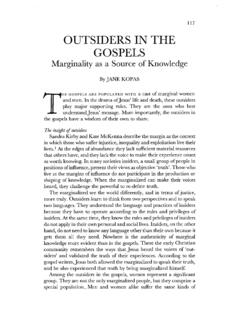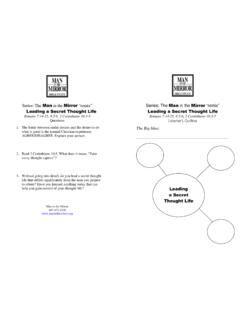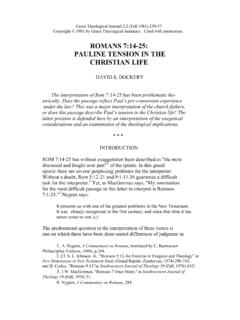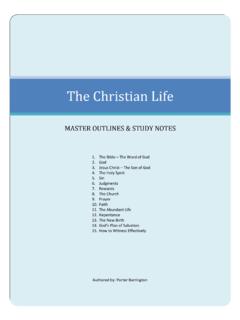Transcription of The Mystical Theology of Karl Rahner
1 The Way, 52/2 (April 2013), 43 62 THE Mystical Theology OF karl Rahner Harvey D. Egan ARL Rahner , of all the significant theologians of the twentieth century, stands alone in calling for a new Mystical Theology . His own views on what he terms the mysticism of daily life , the mysticism of the masses and the mysticism of the classical masters to be explained later play a major role in stressing the importance of mysticism in Theology and christian life . However, he emphasizes the difficulty of defining the word mysticism , the absence of a generally accepted Theology of mysticism and the appalling lack of interest in a contemporary Mystical Theology . He also criticizes some earlier Mystical Theology for simply repeating the teachings of the Spanish classical mystics, for smoothing out the distinctions among them and for naively interpreting them in accordance with an extrinsic understanding of grace according to which direct divine intervention is thought of in the case of Mystical phenomena.
2 1 Rahner s Theology of Grace Rahner is the twentieth century s pre-eminent theologian of grace. In his view, grace is primarily God s universal self-communication, not the sporadic bestowal of certain divine gifts, and all human beings are the addressees of this communication. Therefore, all truly human activity is a free, positive or negative, response to God s offer of self the grace at the heart of human Because God offers nothing less than God s very own self to everyone, the human person is, to Rahner s way of thinking, homo mysticus, Mystical man. This relationship stamps all This article is based on a longer treatment in chapter three of Harvey D. Egan, karl Rahner : Mystic of Everyday life (New York: Crossroad, 1998). 1 karl Rahner , Mystical Experience and Mystical Theology , in Theological Investigations, volume 17, translated by Margaret Kohl (New York: Crossroad, 1981), 90 91. 2 karl Rahner , Gnade als Mitte menschlicher Existenz.
3 Ein Gespr ch mit und ber karl Rahner aus Anla seines 70. Geburtstages , in Herausforderung des Christen (Freiburg im Breisgau: Herder, 1975), 117 153. K 44 Harvey D. Egan personal experiences with at least an implicit, yet primordial, experience of God. Because we do have an immediate, preconceptual experience of God through the experience of the limitless breadth of our consciousness , Rahner writes, there is such a thing as a Mystical component to Christianity .3 In fact, he holds the theological position that, .. in every human person .. there is something like an anonymous, unthematic, perhaps repressed, basic experience of being oriented to God.
4 Which can be repressed but not destroyed, which is Mystical or (if you prefer a more cautious terminology) has its climax in what the classical masters called infused Therefore, all human experiences tend towards an intensification which is directed towards something which one could in fact call Mystical experience .5 In fact, mysticism as the experience of grace grounds not only the ordinary christian s life of faith, hope and love but also that of anyone living according to his or her This view of mysticism as the experience of grace permeates not only Rahner s Mystical Theology but also much of Rahner s overall Theology . Rahner suggests avoiding the term mysticism because of its almost unavoidable association with odd psychic phenomena that have nothing to do with normal christian life although he does not hesitate to use the term himself, and in a variety of He insists, however, that the reality of the experience of God in daily life , rather than the term used for it, is what matters.
5 In the final analysis it is unimportant whether you call such a personal, genuine experience of God, which occurs in the deepest core of a person, Mystical .8 3 karl Rahner in Dialogue, edited by Paul Imhof and Hubert Biallowons (New York: Crossroad, 1986), 182. 4 karl Rahner , Teresa of Avila: Doctor of the Church , in The Great Church Year, edited by Albert Raffelt and Harvey D. Egan (New York: Crossroad, 1993), 362 363 (original emphasis). See also Brief von P. karl Rahner , in Klaus P. Fischer, Der Mensch als Geheimnis. Die Anthropologie karl Rahners (Freiburg im Breisgau: Herder, 1974), 405 406. 5 karl Rahner , Reflections on the Problem of the Gradual Ascent to christian Perfection , in Theological Investigations, volume 3, translated by karl -Heinz and Boniface Kruger (Baltimore: Helicon, 1967), 23. 6 karl Rahner , Mysticism , in Encyclopedia of Theology : A Concise Sacramentum Mundi, edited by karl Rahner (New York: Seabury, 1975), 1010 1011.
6 7 For example, see Handbuch der Pastoraltheologie, volume 3 (2nd edn, Freiburg im Breisgau: Herder, 1972), 523. 8 Faith in a Wintry Season: Interviews and Conversations with karl Rahner in the Last Years of His life , 1982 84, edited by Paul Imhof, Harvey D. Egan and Hubert Biallowons (New York: Crossroad, 1990), 115. The Mystical Theology of karl Rahner 45 Rahner is also convinced that everyone experiences God constantly, not intermittently, although often only in a hidden way: It must be made intelligible to people that they have an implicit but true knowledge of God perhaps not reflected upon and not verbalized; or better expressed, they have a genuine experience of God ultimately rooted in their spiritual existence, in their transcendentality, in their personality, or whatever you want to call This view of grace provides the foundation for Rahner s contemporary Mystical Theology . Despite his frequent use of the terms experience of grace and experience of God , Rahner is not referring to an experience, because God cannot be reduced to a specific content of thought or object of love in consciousness.
7 The transcendental experience of God and of grace, in Rahner s sense, is the ground of all experiences and is not a particular, or categorical , experience to which we can point. As the horizon in which all our experiences take place, the objectless awareness of God and of grace is the atmosphere in which we live, our basal spiritual metabolism, more intimate to us than we are to ourselves, as the mystics are fond of saying. Just as we often overlook or take for granted our breathing, our beating hearts, or our own self-awareness, so too does the ever-present experience of God often remain overlooked, repressed, or even The Mysticism of Everyday life Rahner holds the position that everyone even the agnostic or atheist who lives moderately, selflessly, honestly, courageously and in silent service to others, lives what he calls the mysticism of everyday life .11 He stresses not only the intrinsic unity between the love of God and 9 Faith in a Wintry Season, 115.
8 10 This is a salient theme in Nicholas Lash s book, Easter in Ordinary: Reflections on Human Experience and the Knowledge of God (Notre Dame: U. of Notre Dame P, 1990). 11 See Egan, karl Rahner : Mystic of Everyday life . For concrete examples of the mysticism of everyday life , see karl Rahner , Experiencing the Spirit , in The Practice of Faith, edited by Albert Raffelt and karl Lehmann (New York: Crossroad, 1983), 81. Hans Urs von Balthasar wrote of persevering through the grayness of every day in faith, hope, and love (The Von Balthasar Reader, edited by Medard Kehl and Werner L ser [New York: Crossroad, 1982], 342). Thomas Merton wrote of masked and hidden contemplatives who led hectic lives of self-emptying service and were closer to God than they thought (Thomas Merton, The Inner Experience: Kinds of Contemplation [IV] , Cistercian Studies, 18/4 [1983], 294). St Francis de Sales emphasized an ecstasy of work and life that embraces renunciation and self-denial in true imitation of the crucified Christ (Treatise on the Love of God, translated by John K.)
9 Ryan [Rockford: Tan, 1975], volume 2, book 7, chapters 6 7, 30 33). 46 Harvey D. Egan Ordinary daily life is the stuff of authentic lifeneighbour12 but also Jesus teaching that love for the least of his brethren is love for him even in the case of those who do not know Thus, the most profound form of the mysticism of everyday life , in Rahner s view, is the unreserved love for another. When anyone Hindu, Buddhist, Jew, christian , Muslim, agnostic or atheist courageously and totally accepts life and him- or herself, even when everything tangible seems to be collapsing, then that person experiences, at least implicitly, the holy Mystery that fills the emptiness both of oneself and of life .
10 Accepting the depths of one s humanity, the depths of life and thus Mystery itself fostered either with or without explicit christian faith, hope and charity is the salient feature in Rahner s mysticism of everyday life . This view has profound theological and pastoral significance. I know of no theologian who so emphasizes the idea that we weave the fabric of our eternal lives out of our humdrum daily A genuine christian must have the bold, but often hidden, confidence that ordinary daily life is the stuff of authentic life and real For this reason, the words ordinary , banal , humdrum , routine and the like, appear frequently in Rahner s writings. For him, grace has its history in the person s day-to-day existence with its splendors and failures and is actually experienced there .16 The everydayness of Jesus life grounds Rahner s appreciation of daily life : That which is amazing and even confusing in the life of Jesus is that it remains completely within the framework of everyday living; we could even say that in him concrete human existence is found 12 karl Rahner , Reflections on the Unity of the Love of Neighbor and the Love of God , in Theological Investigations, volume 6, translated by karl -Heinz and Boniface Kruger (Baltimore: Helicon, 1969), 231 249.










